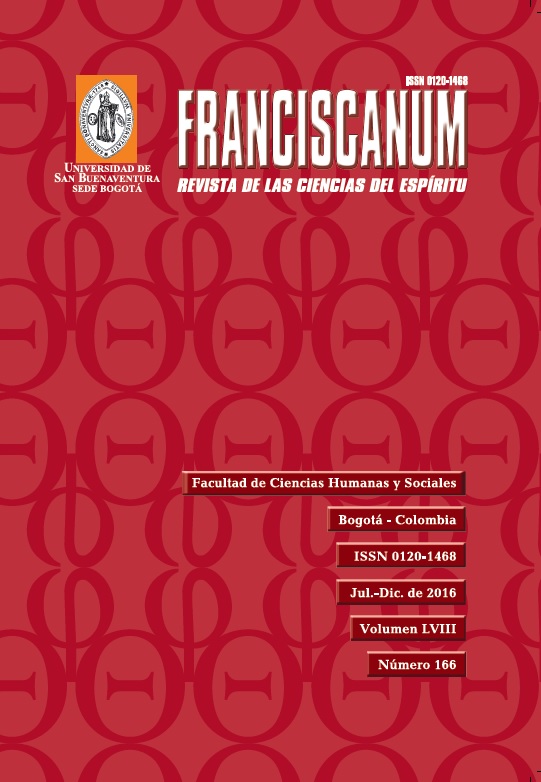This journal provides immediate open access to its content, based on the principle that giving the public free access to research helps a greater global exchange of knowledge.
Therefore, the Creative Commons 4.0 Attribution Attribution - Equal Share (by-sa) License is accepted: The commercial use of the work and the possible derived works is permitted, the distribution of which must be done with a license equal to that regulates the original work.
http://creativecommons.org/licenses/by-sa/4.0/
Along these same lines and in line with the Open Access policy, it is clarified that the authors maintain their rights to articles, without restrictions and, in the same way, they maintain their publication rights, without restrictions. They are only asked to reference the number of the Franciscanum magazine where the article initially appeared.
Abstract
References
Antiseri, D. El problema del lenguaje Religioso. Madrid: Cristiandad, 1976.
Boff, Leonardo. Jesucristo el liberador. Ensayo de cristología crítica para nuestro tiempo. Bilbao: Sal Terrae, 1985.
Documento de Aparecida. Bogotá: San Pablo, 2007.
Echevarría, Bolívar. «El ángel de la historia y el materialismo histórico». En La mirada del ángel. En torno a la tesis sobre la historia de Walter Benjamin. México: Era, 2005. Consultada en agosto 4, 2015, https://excavarymemoria.files.wordpress.com/2011/12/escanear0002.pdf.
Gadamer, H. G. Verdad y método. Salamanca: Sígueme, 1977.
Habermas, J. El discurso filosófico de la Modernidad. Madrid: Katz, 2008.
Heidegger, M. Carta sobre el humanismo. Madrid: Alianza, 2000.
________. «Fenomenología y teología». En Caminos de bosque. Madrid: Alianza, 1996.
________. «La época de la imagen del mundo». En Caminos de bosque. Madrid: Alianza, 1996.
Mardones, J. M. Recuperar la justicia. Santander: Sal Terrae, 2005.
Metz, J. B. La fe, en la historia y en la sociedad. Madrid: Cristiandad, 1979.
________. Memoria Passionis. Santander: Sal Terrae, 2007.
________. Por una cultura de la memoria. Barcelona: Anthropos 1999.
________. Teología del mundo. Salamanca: Sígueme, 1970.
Parra, A. Textos, contextos y pretextos. Bogotá: Pontificia Universidad Javeriana, 2005.
Pöggeler, O. Filosofía y política en Heidegger. Barcelona: Alfa, 1984.
Remarque, E. Sin novedad en el frente. Barcelona: Printer, 1929.
Reyes Mate, M. Heidegger y el judaísmo, sobre la tolerancia compasiva. Barcelona: Anthropos, 1998.
Reyes Mate, M. y Zamora, J. A. Nuevas teologías políticas. Pablo de Tarso en la construcción de Occidente. Barcelona: Anthropos, 2006.
Spinoza, B. Ética según del orden geométrico. Madrid: Orbis, 1980.
Vattimo, Gianni. Hermenéutica y racionalidad. Bogotá: Norma, 1994.




















